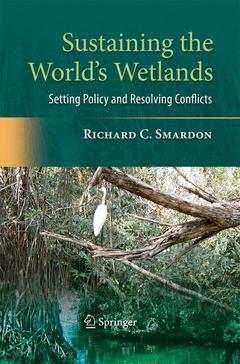Description
Sustaining the World's Wetlands, 2009
Setting Policy and Resolving Conflicts
Language: English
Subjects for Sustaining the World's Wetlands:
Sustaining the World's Wetlands
326 p. · 15.5x23.5 cm · Paperback
326 p. · 15.5x23.5 cm · Paperback
Sustaining the world's wetlands (hardback): setting policy and resolving conflicts
326 p. · 15.5x23.5 cm · Hardback
326 p. · 15.5x23.5 cm · Hardback
Description
/li>Contents
/li>Biography
/li>Comment
/li>
Wetlands throughout the world, including those described in this book are among the most sensitive and vulnerable ecosystems. They are critical habitats to the world?s migratory birds and a broad range of endangered mammal, reptile, amphibian, and plant species. They provide a broad range of flood storage, pollution control, water supply, ecotourism functions to indigenous peoples and country populations as a whole. They are also at the center of severe land and water use conflicts. These are conflicts between counties where wetland resources or the water supplies required for such resources involve more than one country. These are conflicts in use such as conflicts between habitat protection and charcoal production in mangroves. These are conflicts between groups of peoples such as indigenous peoples and hydropower advocates. Many wetlands have already been destroyed by water extractions, dams, levees, channelization, and fills. Others have been degraded by water pollution, overfishing and overhunting, timber harvest, and a host of other activities. This book describes these conflicts and international policies and institutions developed to protect and manage wetland resources. Most of the broader literature and other books on wetlands focuses on wildlife. Wildlife is described in the case studies, which follow. But, Richard Smardon provides us with more. He traces the history of conflicts and the development of policies and insti- tions to protect and manage wetland resources.
International Wetland Policy and Management Issues.- The Wadden Sea Wetlands: A Multi-jurisdictional Challenge.- The Axios River Delta – Mediterranean Wetland Under Siege.- The Kafue Flats in Zambia, Africa: A Lost Floodplain?.- Community-Based Wetland Management: A Case Study of Brace Bridge Nature Park (BBNP), Kolkata, India.- Restoration of the Tram Chim National Wildlife Preserve, Vietnam.- The Great Lakes Wetlands Policy Consortium – Bilateral NGO Action Aimed at the Great Lakes.- Estuaries on the Edge, Yucatan Peninsula, Mexico.- The Mankote Mangrove: Microcosm of the Caribbean.- Review of Wetland Management Roles, Functions, and Innovations.
Richard C. Smardon is professor of Environmental Studies at the SUNY College of Environmental Science and Forestry in Syracuse, NY. He has held titles there as Chair of the Faculty and Director of the Graduate Program, and is also the former director of the Randolph G. Pack Environmental Institute.
Unique global scope provides needed base for comparison Detailed case studies ideal as reference for students and professionals Thorough review of management and policy issues supply practitioners with guidelines and suggestions Includes supplementary material: sn.pub/extras
© 2024 LAVOISIER S.A.S.
These books may interest you

Wetland TechniquesVolumes 1-3 158.24 €



